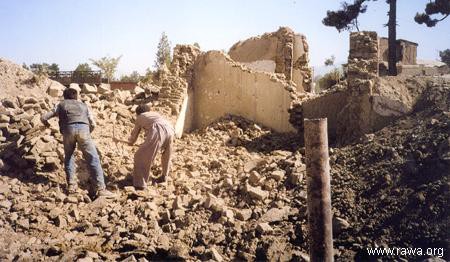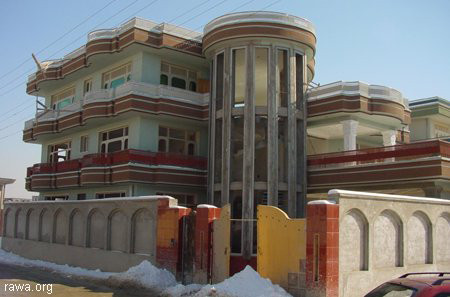By Dexter Filkins
When it comes to governing this violent, fractious land, everything, it seems, has its price.
Want to be a provincial police chief? It will cost you $100,000.
Want to drive a convoy of trucks loaded with fuel across the country? Be prepared to pay $6,000 per truck, so the police will not tip off the Taliban.
Need to settle a lawsuit over the ownership of your house? About $25,000, depending on the judge.
“It is very shameful, but probably I will pay the bribe,” Mohammed Naim, a young English teacher, said as he stood in front of the Secondary Courthouse in Kabul. His brother had been arrested a week before, and the police were demanding $4,000 for his release. “Everything is possible in this country now. Everything.”
Kept afloat by billions of dollars in American and other foreign aid, the government of Afghanistan is shot through with corruption and graft. From the lowliest traffic policeman to the family of President Hamid Karzai himself, the state built on the ruins of the Taliban government seven years ago now often seems to exist for little more than the enrichment of those who run it.
A raft of investigations has concluded that people at the highest levels of the Karzai administration, including President Karzai’s own brother, Ahmed Wali Karzai, are cooperating in the country’s opium trade, now the world’s largest. In the streets and government offices, hardly a public transaction seems to unfold here that does not carry with it the requirement of a bribe, a gift, or, in case you are a beggar, “harchee” — whatever you have in your pocket.
The corruption, publicly acknowledged by President Karzai, is contributing to the collapse of public confidence in his government and to the resurgence of the Taliban, whose fighters have moved to the outskirts of Kabul, the capital.
“All the politicians in this country have acquired everything — money, lots of money,” President Karzai said in a speech at a rural development conference here in November. “God knows, it is beyond the limit. The banks of the world are full of the money of our statesmen.”
The decay of the Afghan government presents President-elect Barack Obama with perhaps his most underappreciated challenge as he tries to reverse the course of the war here. Mr. Obama may be required to save the Afghan government not only from the Taliban insurgency — committing thousands of additional American soldiers to do so — but also from itself.
“This government has lost the capacity to govern because a shadow government has taken over,” said Ashraf Ghani, a former Afghan finance minister. He quit that job in 2004, he said, because the state had been taken over by drug traffickers. “The narco-mafia state is now completely consolidated,” he said.
On the streets here, tales of corruption are as easy to find as kebab stands. Everything seems to be for sale: public offices, access to government services, even a person’s freedom. The examples mentioned above — $25,000 to settle a lawsuit, $6,000 to bribe the police, $100,000 to secure a job as a provincial police chief — were offered by people who experienced them directly or witnessed the transaction.
People pay bribes for large things, and for small things, too: to get electricity for their homes, to get out of jail, even to enter the airport.
Governments in developing countries are often riddled with corruption. But Afghans say the corruption they see now has no precedent, in either its brazenness or in its scale. Transparency International, a German organization that gauges honesty in government, ranked Afghanistan 117 out of 180 countries in 2005. This year, it fell to 176.
“Every man in the government is his own king,” said Abdul Ghafar, a truck driver. Mr. Ghafar said he routinely paid bribes to the police who threatened to hinder his passage through Kabul, sometimes several in a day.
Nowhere is the scent of corruption so strong as in the Kabul neighborhood of Sherpur. Before 2001, it was a vacant patch of hillside that overlooked the stately neighborhood of Wazir Akbar Khan. Today it is the wealthiest enclave in the country, with gaudy, grandiose mansions that cost hundreds of thousands of dollars.

BBC, Sep. 12, 2003: Miloon Kothari, appointed by the United Nations Commission on Human Rights to investigate abuses in Afghanistan, announced that various government ministers including Fahim and Education Minister Younis Qanooni were illegally occupying land and should be removed from their posts.
Sherpur Scandal | Buildings of Afghan Ministers and Warlords

Chicago Tribune, March 16, 2008: Instead of calling the fancy neighborhood in Kabul "Shirpur," which means "child of a lion," Afghans now call it "Shirchoor," which means "looted by lions." English speakers describe the architecture style as "narco-tecture."
Sherpur narco-mansion: Gap between rich and poor in Kabul
Afghans refer to them as “poppy houses.” Sherpur itself is often jokingly referred to as “Char-pur,” which literally means “City of Loot.”
Yet what is perhaps most remarkable about Sherpur is that many of the homeowners are government officials, whose annual salaries would not otherwise enable them to live here for more than a few days.
One of the mansions — three stories, several bedrooms, sweeping balconies — is owned by Abdul Jabbar Sabit, a former attorney general who made a name for himself by declaring a “jihad” against corruption.
After he was fired earlier this year by President Karzai, a video began circulating around town showing Mr. Sabit dancing giddily around a room and slurring his words, apparently drunk. Mr. Sabit now lives in Canada, but his house is available to rent for $5,000 a month.
An even grander mansion — ornate faux Greek columns, a towering fountain — is owned by Kabul’s police chief, Mohammed Ayob Salangi. It can be had for $11,000 a month. Mr. Salangi’s salary is unknown; that of Mr. Karzai, the president, is about $600 a month.
Mr. Ghani, the former finance minister, said the plots of land on which the mansions of Sherpur stand were doled out early in the Karzai administration for prices that were a tiny fraction of what they were worth. (Mr. Ghani said he was offered a plot, too, and refused to accept it.)
“The money for these houses was illegal, I think,” said Mohammed Yosin Usmani, director general of a newly created anticorruption unit.
Often, the corruption here is blatant. On any morning, you can stand on the steps of the Secondary Courthouse in downtown Kabul and listen to the Afghans as they step outside.
One of them was Farooq Farani, who has been coming to the court for seven years, trying to resolve a property dispute. His predicament is a common one here: He fled the country in 1990, as the civil war began, and returned after the fall of the Taliban, only to find a stranger occupying his home.
Yet seven years later, the title to Mr. Farani’s house is still up for grabs. Mr. Farani said he had refused to pay the bribes demanded by the judge in the case, who in turn had refused to settle his case.
“You are approached indirectly, by intermediaries — this is how it works,” said Mr. Farani, who spent his exile in Wiesbaden, Germany. “My house is worth about $50,000, and I’ve been told that I can have the title if I pay $25,000 — half the value of the home.”
Tales like Mr. Farani’s abound here, so much so that it makes one wonder if an honest man can ever make a difference.
Amin Farhang, the minister of commerce, was voted out of Mr. Karzai’s cabinet by Parliament earlier last month for failing to bring down the price of oil in Afghanistan as the price declined in international markets. In a long talk in the sitting room of his home, Mr. Farhang recounted a two-year struggle to fire the man in charge of giving out licenses for new businesses.
The man, Mr. Farhang said, would grant a license only in exchange for a hefty bribe. But Mr. Farhang found that he was unable to fire the man, who, he said, simply bribed other members of the government to reinstate him.
“In a job like this, a man can make 10 or 12 times his salary,” Mr. Farhang said. “People do anything to hang on to them.”
Many Afghans, including Mr. Ghani, the former finance minister, place responsibility for the collapse of the state on Mr. Karzai, who, they say, has failed repeatedly to confront the powerful figures who are behind much of the corruption. In his stint as finance minister, Mr. Ghani said, two moments crystallized his disgust and finally prompted him to quit.
The first, Mr. Ghani said, was his attempt to impose order on Kabul’s chaotic system of private property rights. The Afghan government had accumulated vast amounts of land during the period of Communist rule in the 1970s and 1980s. And since 2001, the government has given much of it away — often, Mr. Ghani said, to shady developers at extremely low prices.
Much of that land has been sold and developed, rendering much of Kabul’s property in the hands of unknown owners. Many of the developers who were given free land, Mr. Ghani said, were also involved in drug trafficking.
When he proposed drawing up a set of regulations to govern private property, Mr. Ghani said, he was told by President Karzai to stop.
“ ‘Just back off,” he told me,’ ” Mr. Ghani said. “He said that politically it wasn’t feasible.”
A similar effort to impose regulations at the Ministry of Aviation, which Mr. Ghani described as rife with corruption, was met with a similar response by President Karzai, he said.
“Morally the question was, am I becoming the fig leaf to legitimate a system that was deeply corrupt? Or was I there to serve the people?” Mr. Ghani said. “I resigned.”
Mr. Ghani, who then became chancellor of Kabul University, is today contemplating a run for the presidency.
Asked about Mr. Ghani’s account on Thursday, Humayun Hamidzada, a spokesman for Mr. Karzai, said he could not immediately comment.
The corruption may be endemic here, but if there is any hope in the future, it would seem to lie in the revulsion of average Afghans like Mr. Farani, who, after seven years, is still refusing to pay.
“I won’t do it,” Mr. Farani said outside the courthouse. “It’s a matter of principle. Never.”
“But,” he said, “I don’t have my house, either, and I don’t know that I ever will.”



